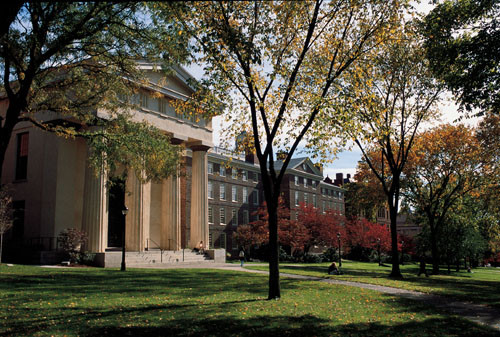
In 2003, Providence was facing a deficit that, at the time, was unprecedented. In an attempt to help the city, four private universities – Brown University, Johnson & Wales University, Providence College and Rhode Island College of Design – signed a Memorandum of Understanding (MOU) pledging to pay the city approximately $48 million over 20 years.
Now, in 2011, Providence once again faces a deficit and city leaders have turned to the nonprofits to help raise much-needed revenue. In addition to discussions about how to help the city financially, nonprofits are also in negotiations about the undeveloped land freed by the Interstate 195 relocation.
Legislation was proposed in the General Assembly to require nonprofit organizations, specifically hospitals and universities, to pay the city 25 percent of their tax assessment. The private universities of Providence did not embrace it.
“It would be a dramatic change in state tax policy, by one piece of legislation,” said Dan Egan, president of the Association of Independent Colleges and Universities of Rhode Island. “It would be a tax on education. We would have to either pass it on to our students or the money would have to come from somewhere, so we’d have to cut budgets. It would really stop any forward progress for [our sector] coming out of this recession.”
The General Assembly recently adjourned without voting on the legislation.
But Mayor Angel Taveras’ fiscal 2012 budget asked the universities to pay an additional $7 million in support as a way to close a $110 million structural deficit. Spokesperson Melissa Withers said earlier this month that negotiations between Taveras and the universities were ongoing on that request. The City Council was tentatively scheduled to vote on the budget on July 13.
Egan pointed out that this recession has hit the nonprofits as well as the city.
The universities are, however, willing to help in other ways.
Marisa Quinn, vice president of public affairs and university relations for Brown University, said that the university is in conversations with Taveras about how it can help the city.
“We’re optimistic that our relationship with the city of Providence will remain strong,” Quinn said. “We know we have a role to play to be a partner.” She said that they understand that Providence is going through a hard time financially and working out ways that Brown can help.
“We have a record of contribution,” Egan said. “We see that there are other ways. We stand open to have a conversation about this.”
The fiscal 2012 state budget includes an increase in the payment-in-lieu-of-taxes (PILOT) program. Last year’s program was $27.5 million and this year’s program was increased to $33 million. Providence is projected to earn additional money from this change.
According to a November 2010 report from the Commission to Study Tax-Exempt Institutions, the city received approximately $19 million in revenue from the Rhode Island PILOT program.
Connecticut and Rhode Island are unique because their PILOT programs require the state government to make payments to local governments for a fixed percentage of tax revenue from their tax-exempt colleges and universities, according to the report. Other states make payments to local governments for state properties.
Another issue being discussed is the land freed up by the I-195 relocation. It involves about 35 acres in Providence, with roughly 20 acres available for development, according to a statement released by the city in January. “We clearly have an interest in how 195 is developed,” Quinn said. “We’ve talked to the city and the state about how we can support a shared agenda there.”
State lawmakers did approve legislation creating a powerful commission to oversee the development of the land. The legislation, which was expected to be signed into law by Gov. Lincoln D. Chafee, creates a seven-member commission to oversee the project. The governor would appoint all the members, after considering three recommendations submitted by the mayor of Providence and one from the speaker of the House.
The state Senate must confirm all the members.
“It’s unfortunate that Providence does not have the final say [in the development of the 195 land],” City Council President Michael Solomon said. “But it will have some say with what happens.”
And negotiations between Providence and the nonprofits are ongoing and all sides agree that is the key.
“I think at some point their willingness to help out and … to sit at the table is a good indication that we will strike up some sort of agreement moving forward,” Solomon said of the nonprofits.
Egan said that while there is a fear that the universities will be asked to “plug the hole” every time there is a deficit, “We’ve always seen it as an opportunity,” an ability to be a good partner.
“We can’t be successful entities in a dying city,” Egan said. “Our success is intertwined.” •












